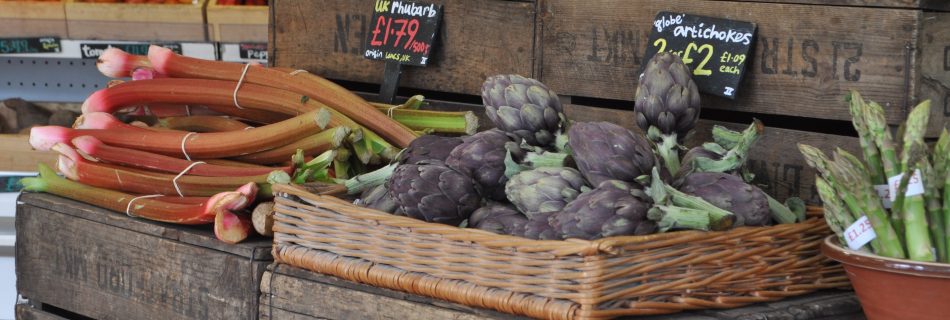Seasonal and local guide: fruit and vegetables

This our guide to seasonal fruit and veg. We’ve tried to cover all bases, listing the main foods you can forage or buy in England. Undoubtedly we’ve missed some, but it is something to get you started.
Fruit and vegetables with year-round availability
Spinach, potatoes, garlic, mushrooms, salad leaves, onions, carrots, chard are available nearly all year round, as are grains, seeds and pulses because they are dried. If you store them correctly, dried goods can last for years without spoiling. And there are also frozen foods. Berries can be enjoyed year round if you freeze them in season. The same applies for beans and peas.
If you pickle, ferment, or preserve fruits and veg you can also extend their life. Sauerkraut was introduced by the Eastern Europeans and became popular due to its high vitamin C content; an important nutrient we need during the winter months to prevent scurvy. If you don’t plan on using all your fresh herbs, consider drying them so they can be stored.
Spring
March: carrots, swede, parsnips, leeks, Brussel sprouts, red cabbage, spring greens, purple-sprouting broccoli (PSB), kale, celeriac, cauliflowers, potatoes, apples and pears.
April: watercress, leeks, mushrooms, rocket, garlic, radishes, salad leaves, curly kale, spring onion, new potatoes, celeriac, rhubarb, apricots and gooseberries.
May: Asparagus, radishes, rocket, sorrel, PSB, spring greens, watercress, kale, spinach, peppers, broad beans, rhubarb, apricots and gooseberries.
Summer
 Throughout summer: Aubergine, beans (runner, French, broad), broccoli, peppers, beetroot, carrots, cauliflowers, courgettes, cucumber, fennel, fresh peas, green beans, lettuce, rocket and salad leaves, new potatoes, radishes, runner beans, sage, salad onions, squash, tomatoes, watercress blueberries, currants (black, white and red), elderflower berries, greengages, loganberries, plums, raspberries, strawberries, tayberries and sage.
Throughout summer: Aubergine, beans (runner, French, broad), broccoli, peppers, beetroot, carrots, cauliflowers, courgettes, cucumber, fennel, fresh peas, green beans, lettuce, rocket and salad leaves, new potatoes, radishes, runner beans, sage, salad onions, squash, tomatoes, watercress blueberries, currants (black, white and red), elderflower berries, greengages, loganberries, plums, raspberries, strawberries, tayberries and sage.
June: Asparagus, cabbage, courgettes, tomatoes, peas, beetroot, celery, sorrel, spring greens, watercress, celery, rhubarb, radishes, raspberries, strawberries, apricots, cherries, gooseberries.
July: asparagus, cauliflower, cabbage, garlic, celery, courgettes, tomatoes, beetroot, sorrel, peas, new potatoes, watercress, kohlrabi, rhubarb, cherries, peaches, blackcurrants and greengages.
August: marrows, tomatoes, garlic, cauliflower, courgettes, leeks, radishes, sorrel, sweetcorn, peas, watercress, Brussel sprouts, beetroot, celery, cabbage, kohlrabi (click here to learn more), apples, strawberries, gooseberries, peaches, raspberries, apricots, cherries, blackcurrants, pears, plums and greengages.
Autumn
Throughout autumn: field mushrooms, pears, apples, cooking apples, swede, Brussel sprouts, beetroot, kohlrabi and leeks.
September: marrow, aubergine, sweetcorn, garlic, pumpkin, cauliflower, tomatoes, radishes, broccoli, celery, courgettes, parsnips, peppers, rocket, cabbage, beans (runner, French, broad), watercress, peas, sorrel, plums, raspberries, peaches, gooseberries, apricots, blackberries, damsons and plums.
October: chestnuts, marrow, aubergine, garlic, broccoli, courgette, parsnips, sweetcorn, beans (runner, French, broad), rocket, turnips, watercress, celery, tomatoes, kale, red cabbage, cauliflower, pumpkins, turnips, cranberries, elderberries and sloes.
November: chestnuts, pumpkins, parsnips, turnips, kale, red cabbage, celery, cauliflower, cranberries, elderberries and sloes.
Winter
 Throughout winter: brussel sprouts, cabbage, beetroot, carrots, cauliflower, celeriac, celery, leeks, curly kale, fennel, leeks, parsnips, potatoes, red cabbage, swede, turnips, bay leaves, apples, pear and cooking apples.
Throughout winter: brussel sprouts, cabbage, beetroot, carrots, cauliflower, celeriac, celery, leeks, curly kale, fennel, leeks, parsnips, potatoes, red cabbage, swede, turnips, bay leaves, apples, pear and cooking apples.
December: chestnuts, field mushrooms, parsnips, pumpkin, rhubarb, swede and cranberries.
January: Jerusalem artichoke and rhubarb.
February: PSB, Jerusalem artichoke and rhubarb.
Tags: British produce, local fruit, local vegetables, seasonal food

